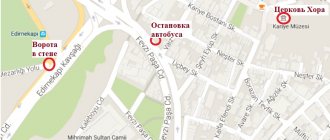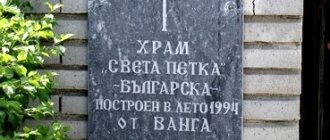The Church does not recognize Vanga
15 years have passed since the death of the Bulgarian clairvoyant Vanga. One could ignore the excitement around this date in the secular media, but in the NTV program “Russian Sensations” Vanga is shown surrounded by the clergy during a christening. Moreover, during her lifetime, she used her own money to build a church in honor of Saint Petka in Rupite, where she lived. Many non-church people compare her with the blessed Matrona of Moscow. What is the fundamental difference between them and how does the Bulgarian Orthodox Church relate to Vanga?
Alexander Dvorkin, head of the department of sectology at PSTGU: - I already wrote in “Athos Stories” about Metropolitan Nathanael of Nevrokop (Vanga lived on the territory of the Nevrokop diocese), how shortly before Vanga’s death, messengers from her came to Vladyka and said that Vanga needed his advice and asks to come to her. A few days later, Metropolitan Nathanael arrived and entered Vanga’s room. In his hands he held a reliquary cross with a piece of the Holy Cross of the Lord. There were a lot of people in the room, Vanga was sitting in the back, saying something and couldn’t hear that another person had quietly entered the door, and she certainly couldn’t know who it was. Suddenly she interrupted and in a changed - low, hoarse - voice said with effort: “Someone came here. Let him throw THIS on the floor immediately!” "What is this""? – the stunned people around asked Vanga. And then she broke into a frantic cry: “THIS! He holds THIS in his hands! THIS is stopping me from speaking! Because of THIS I can't see anything! I don’t want THIS in my house!” - the old woman screamed, kicking her legs and swaying. Vladyka turned around, went out, got into the car and drove away. Vanga was a sorceress and was in contact with dark forces. During her lifetime, she, like any person, could repent, and this is exactly what Metropolitan Nathanael hoped for when he responded to her request. But, alas, she did not repent, and, naturally, the Bulgarian Orthodox Church has a negative attitude towards her. The witch herself really wanted to show her connection with Orthodoxy, since in this way she hoped to attract new “clients”. For this purpose, she built a temple on the territory of her estate, but if you look closely, it can hardly be called Orthodox. Some external forms are respected, but the icons are terrible, the architecture is monstrous, everything is rude, clumsy, and in general everything is built around Vanga. It was supported by schismatic or openly sectarian pseudo-Orthodox groups. Anyone can dress up in a cassock, but that will not make him a priest. Well, as for the fact that she was someone’s godmother, everyday Orthodoxy, in which only some external forms are observed, without connection with the content, and sometimes in spite of it, is even more widespread in Bulgaria than in Russia. In our country, too, sometimes unbaptized people become godparents - non-church parents invite their friends to be godparents, without even asking whether they are baptized. The same thing often happens in Bulgaria. But I don’t understand what Vanga and Blessed Matrona of Moscow have in common. Blindness? So Homer was blind. And the Venetian Doge Enrico Dondolo saw nothing either. Nevertheless, he managed to lead the 4th Crusade to the walls of Constantinople and led the treacherous capture of the Byzantine capital, unprecedented robbery and desecration of its shrines. Vanga openly practiced witchcraft, spoke about a special gift that appeared to her after a traumatic brain injury, and took money for the reception. It was a well-organized and well-established business, from which a lot of people profited - everyone around the Bulgarian sorceress. Blessed Matrona lay paralyzed, humbly carried her cross and prayed to God for the people who asked her about it. Recorded by Leonid VINOGRADOV
print version
Tags:
Spiritual life Fighting passions Superstition
The Orthodox Church about Vanga and her prophecies: attitude, opinion and answers to frequently asked questions
There is a large amount of different literature describing the life of the Bulgarian soothsayer. The texts are monotonous and rely on external events and ordinary emotions. The attitude of the Orthodox Church towards Vanga was formed under the influence of eyewitnesses, literature and analysis of her actions. Even the most detailed books do not provide a full disclosure of the personality of Vanga, who gained popularity and became known thanks to magazine articles. The Church claims that the activities of the Bulgarian seer were in no way consistent with the canons of Orthodoxy and the moral foundations of the Christian religion. Church opinion Sacred texts prohibit believers from turning to skilled fortune-tellers and magicians, even if these people rely on higher powers within their hearts. Prediction is a type of magic and paganism that helps penetrate into the areas of the universal world order. Those looking to the future question the power of Heavenly Father and in some way limit the freedom of human choice. The Apostle Paul warns: dark forces disguise themselves in light and try to deceive the soul into a dishonorable path. Ordinary people often call the soothsayer a saint, comparing her with the Matrona of Moscow. Difficulties in forming attitudes arise due to the fact that the Orthodox Church rejects Vanga’s authority, considering the seer’s activities inappropriate. Modern believers have difficulty recognizing the light forces from the disguised dark ones and are moving away from the true teachings of the Savior Christ. This ignorance is formed on the basis of an atheistic environment and religious illiteracy. -However, the Church leaves a chance that prophecies can come true. According to the clergy, demonic forces, striving to disorient the will of a person, force the latter to act in accordance with the desires of the demons. The Lord does not reveal His will to the soothsayers who have connected their lives with dark forces. Therefore, the clairvoyant Vanga, rejected by the Church, is not an authority in the Orthodox world. -Priests claim: holiness in Christianity is manifested through a full-fledged spiritual experience that does not affect a person’s free will. The grace bestowed by the Lord comes after many years of ascetic practice and unquestioning observance of the commandments. The fruits of perfection appear through years of purifying petitions. To obtain holiness and special gifts, Revelation through the descent of the Spirit is necessary. -Vanga’s biography tells that she was far from the conditions for acquiring light abilities. The clairvoyant was deeply mistaken about true faith. During her sessions, she went into a deep trance, after which she could not recreate the picture of what she saw in her memory. Eyewitnesses noticed that during the rituals Vanga operated with other people's voices or imitated the sounds of animals. These signs are similar to possession, but not to holiness. -Testimonies and biographical facts confirm the communication of the soothsayer with fallen spirits. Vanga often used crystals and other similar paraphernalia for fortune telling. Otherworldly forces revealed to the clairvoyant the secrets of the past, present and distant future, which they only predict, but do not know for sure. Very often predictions do not come true. Demons who enter into dialogue with a medium explain themselves in unclear language or deliberately deceive. The seer's predictions took on the form of understatement and gave rise to doubt. -The prophecies of Christian saints were spread in the name of salvation. Believers were given a chance to avoid misfortunes of various sizes through diligent repentance and denial of sinfulness. The predictions of the Bulgarian clairvoyant show a stern doom, as if there is no God at all who can create everything that is necessary. -Vanga, according to the Church, did not realize her connection with the world of fallen spirits, just as the eyewitnesses of her predictions did not understand this. There is no need to see the other world to accomplish earthly affairs. The knowledge of God's Law should serve as our luminary. The one who keeps the commandments and directs his spiritual gaze to the Creator himself will not be deceived. With the money of the soothsayers, they built a temple in honor of Paraskeva of Bulgaria. The architecture and wall painting was done by the artist S. Rusev, an admirer of N. Roerich. This church was dubbed “Masonic”, since the altar and frescoes did not at all correspond to Christian ideas. Opposite the image of Christ is a portrait of the seer Vanga, made in the style of a “pseudo-icon”. Construction was considered as a sacrifice and began in 1992. Today the temple is used as a tourist center.
Source
Vanga's life and supernatural abilities
Vanga was born on January 31, 1911 in the territory of the modern Republic of Macedonia. The girl was born very weak, her family did not believe that she would survive, so they did not give the newborn a name.
For the first time, relatives heard Vanga crying two months after her birth. Then she received the fateful name - Vangelia, which is translated from Greek as 'good news'.
From childhood, the girl was distinguished by her hard work, which her peasant parents taught her. When Vanga was three years old, Paraskev's mother died, and the girl remained with Pande's father. With the outbreak of the First World War, he was mobilized, Vanga remained to live with a neighbor.
Biography of Vanga
Vangelia Gushcherova was born in 1911 in the city of Strumice into a poor family. When the little girl was 3 years old, her mother died in childbirth. An event that radically influenced Vanga’s fate occurred in 1923. She was in the company of her sisters when a powerful hurricane arose and carried the future clairvoyant into the field. She was found in a mound of branches and sand; the girl underwent several operations on her eyes, but her vision could not be restored.
- At the age of 14, Vangelia was sent to the House of the Blind, located in Serbia. Here she studied a special alphabet, studied music, sewing and cooking.
- At the age of 18, Vangelia receives a marriage proposal from a wealthy man named Dimitar. However, the wedding is upset because news arrives of the death of the stepmother. Vangelia returns home to look after her brothers and sisters.
- Vanga discovered her superpowers in 1941. Spirits began to come to her, promising help in making predictions; the seer spoke in an alien voice, fell into a deep trance, communicated with the dead and found the location of lost people. Vanga claimed that John Chrysostom announced to her the gift of divination.
- In 1942, Vanga got married, but the marriage turned out to be childless and unhappy, and her husband died at the age of 42.
- In 1982, the seer was founded in the area of Rupit, where she found great respect and recognition from the local residents.
Vanga died of cancer when she was 85. The funeral ritual was attended by a large number of adherents of her gift, among whom were prominent politicians, deputies and ministers. The attitude of the Orthodox Church to Vanga's predictions








